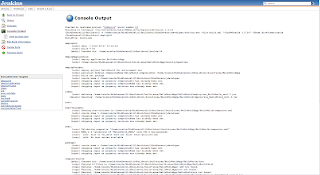Introduction
'builds' globally consist of several steps (details can differ among different customers)
- selecting what to build. this can be based for example on a tag or status/property of a source in a version control system or a selection of tasks with a specific status (if issue management and version control are linked).
- preparing a workarea / workspace based on the above
- triggering a build (manually or automated by monitoring a version control system)
- archiving the build ('releasing')
This post will have a limited scope since putting the above into place is customer specific and requires some time (a project) to achieve a production ready setup. I will manually trigger a build for a prepared workarea. This can of course be expanded. I've chosen to call Ant from Jenkins. The following post describes how Maven can be used to wrap Ant; http://redstack.wordpress.com/2011/03/15/getting-started-with-continuous-integration-for-soa-projects/. Ant wraps Java classes to achieve deployment. Jenkins has plug-ins to directly call Ant tasks and has easy integration in the GUI (Ant output parsing). I do not see the added benefit of wrapping Ant in Maven.
I've installed Jenkins as described on; https://wiki.jenkins-ci.org/display/JENKINS/Installing+Jenkins+on+Ubuntu
I've chosen for Jenkins instead of Hudson based on http://stackoverflow.com/questions/4973981/how-to-choose-between-hudson-and-jenkins.
The Buildserver installed is an Ubuntu 12.04 server 64 bit installation.
Implementation
I've adapted the scripts used in my previous buildtool post slightly for this purpose. I've used a JDeveloper installation instead of 'manually' copying JAR files. This has the benefit that JDeveloper can easily be upgraded and plugins can more easily be installed using the GUI. This provides a more steady and flexible base for the buildtool then manually copying JAR files.
MDS and adf-config.xml
Also for the purpose of MDS dependencies I've expanded the build.xml file to write an application specific adf-config.xml and copy it to the relevant application directory. The adf-config is copied to the application directory and it contains placeholders; MDS_REPOSITORY and MDS_APPLICATION. These are replaced in the build.xml using;
Copy to application
<mkdir dir="${proj.compositeDir}/${proj.compositeName}/SCA-INF/classes/META-INF"/>
<copy file="${base.dir}/adf-config.xml" tofile="${proj.compositeDir}/${proj.compositeName}/SCA-INF/classes/META-INF/adf-config.xml"/>
Replace placeholders
<replace file="${proj.compositeDir}/${proj.compositeName}/SCA-INF/classes/META-INF/adf-config.xml" token="MDS_REPOSITORY" value="${mds.repository}"/>
<replace file="${proj.compositeDir}/${proj.compositeName}/SCA-INF/classes/META-INF/adf-config.xml" token="MDS_APPLICATION" value="${mds.application}"/>
Buildtool setup
I've installed JDeveloper in /home/oracle/Middleware11116. I've used the standard installer. I did however encounter the following problem when I tried to call the 32 bit JDeveloper installer on a 64 bit OS; http://stackoverflow.com/questions/2716702/no-such-file-or-directory-error-when-executing-a-binary
I've created a buildtool directory /home/oracle/Middleware11116buildtool. In this directory I've created a symlink Middleware to /home/oracle/Middleware11116. The directory structure is as followed;
-rw-rw-r-- 1 oracle oracle 1911 Aug 21 09:40 adf-config.xml
drwxrwxr-x 3 oracle oracle 4096 Aug 23 16:40 build-area
-rw-rw-r-- 1 oracle oracle 83 Aug 25 13:06 build.num
-rw-rw-r-- 1 oracle oracle 925 Aug 25 12:59 build.properties
drwxrwxr-x 16 oracle oracle 4096 Aug 25 13:06 builds
-rw-rw-r-- 1 oracle oracle 21961 Aug 25 10:54 build.xml
-rwxrwxr-x 1 oracle oracle 449 Aug 23 13:32 deployAll
-rw-rw-r-- 1 oracle oracle 407 Aug 14 09:05 deployAll.bat
-rw-rw-r-- 1 oracle oracle 261 Aug 5 18:07 dev.jndi.properties
drwxrwxr-x 2 oracle oracle 4096 Aug 23 13:33 junit
drwxrwxr-x 2 oracle oracle 4096 Aug 23 13:16 lib
drwxrwxr-x 2 oracle oracle 4096 Aug 25 13:06 logs
lrwxrwxrwx 1 oracle oracle 28 Aug 23 13:19 Middleware -> /home/oracle/Middleware11116
You can download the scripts here; http://dl.dropbox.com/u/6693935/blog/buildtoolscriptsincmds.zip
Jenkins setup
After the Jenkins installation I've added the Jenkins user to the oracle group (/etc/group) in order to access the buildtool, Ant, JDK, etc. After having started Jenkins, first I've configured the JDK and Ant;
I've set these to the JDeveloper JDK and Ant
Then I've created a multiconfiguration project
I've done this in order to be able to allow different configurations to be deployed at a later stage. I've not tried this yet though.
Then I've selected the JDK ant Ant version to be used. Important here is;
- specify the base dir in which Ant is executed; base.dir=/home/oracle/Middleware11116buildtool. this makes sure Ant can find the required scripts and of course the build.properties!
- specify the build.xml file; /home/oracle/Middleware11116buildtool/build.xml.
Running
After the task is configured, it can be run. This results in the below
The different Ant tasks which are executed can be navigated to by clicking at the left side of the Console output on the specific task. Also the result is analyzed; in this case of course BUILD SUCCESFUL.










